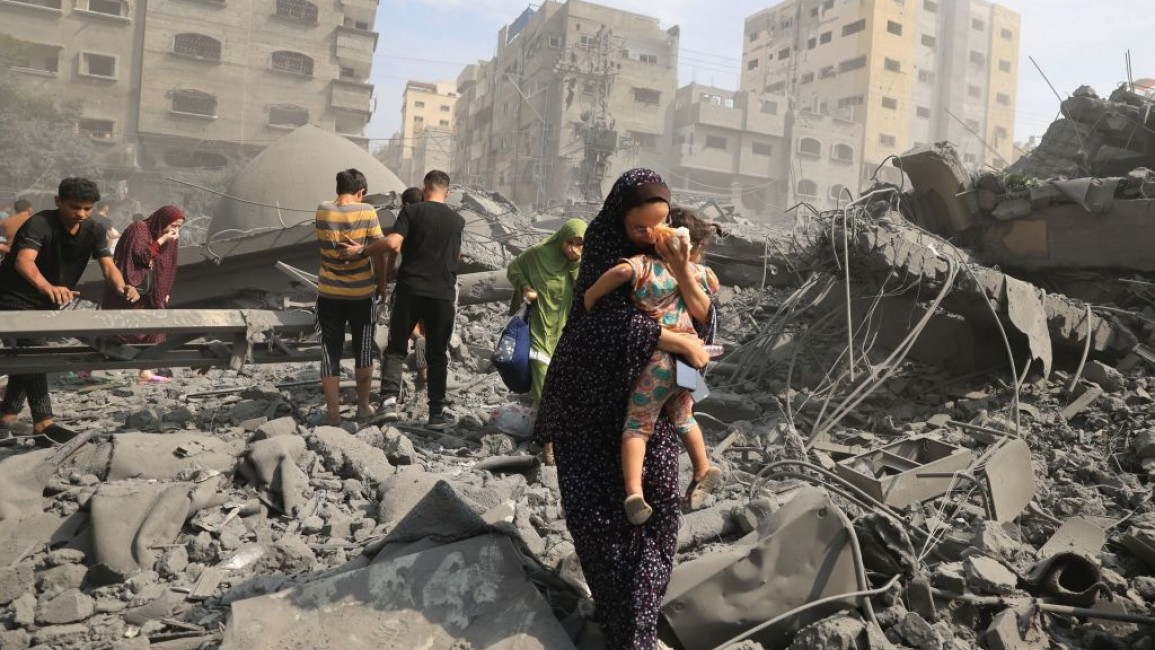
Gaza's never-ending catastrophe
Israel’s military response to the brutality of the Hamas attack on October 7, which has claimed the lives of nearly 3,000 people in Gaza and displaced hundreds of thousands, has evoked every Palestinian’s worst nightmare.
In 1948, roughly 750,000 Palestinians – including my father, uncle, and grandmother – fled their homes to escape the violence that followed the declaration of Israel and the violence by the Jewish underground against many Palestinian villages and towns.
My uncle, who stayed behind in Jerusalem’s Musrara neighbourhood until April 1948, assured my father and grandmother that the house would remain safe until they could go back once the fighting ended. He had locked it by turning the key twice, believing that they would return soon. They never did.
''The rhetoric of some Israeli officials calling for a reoccupation or depopulation of Gaza has revived Palestinians’ painful memories of the Nakba. Palestinian refugees, especially those in northern Gaza, have no desire to live in the Sinai Peninsula; they still yearn to return to their ancestral homes within the present-day borders of Israel. At the very least, they wish to live in Gaza with dignity, free from occupation, blockades, and travel restrictions.''
The trauma of that first Arab-Israeli War was so profound that Palestinians call it the Nakba (“catastrophe”) and commemorate it every year on May 15. Earlier this month, when Danny Ayalon, Israel’s former ambassador to the United Nations, told Al Jazeera’s Marc Lamont Hill that there is “endless space” for Gazan civilians in Egypt’s Sinai Peninsula and that they “should all be moved there,” many Palestinians interpreted this as a call for a second Nakba. That is why the Israeli order to evacuate 1.1 million people from northern Gaza has stoked fears of a repeat of 1948.
The Gaza Strip has long been a thorn in Israel’s side. In 1992, then-Israeli Prime Minister Yitzhak Rabin famously remarked, “I wish I could wake up one day and find that Gaza has sunk into the sea.” A year later, Rabin and the late PLO chairman Yasser Arafat shook hands in the White House’s Rose Garden after signing the Oslo Accords. Tragically, Rabin’s assassination by a Jewish far-right extremist in 1995 robbed both Israel and the international community of an Israeli leader who recognised that the two-state solution represented the best hope for Israel’s security and a homeland for the Palestinians.
Israel’s warning to Palestinian civilians to evacuate northern Gaza has been strongly opposed by leaders worldwide, while US President Joe Biden has said that a full-scale Israeli occupation of Gaza would “be a big mistake.” But Israel insists that civilians must move south to protect themselves when Israel inevitably launches a large-scale ground invasion in response to the mass murder of Israeli citizens by Hamas, which has controlled Gaza since 2006.
Displacing the Palestinian residents of northern Gaza, however, would be a flagrant violation of international law. Moreover, Israel’s post-war plans for this area remain unclear. Does Israel intend to create a buffer zone that stretches deep into Gaza, or does it want to return settlers to Gaza? If the primary objective is to protect Israeli communities, then Israel can and should designate its own territory for such a buffer, rather than encroaching on the tiny and densely populated strip of land currently inhabited by more than two million Palestinians.
The atrocities committed by Hamas and others on October 7, which claimed the lives of more than 1,300 Israeli civilians, have significantly harmed the Palestinian cause and must be unequivocally condemned by anyone who supports the establishment of an independent Palestine. While Palestinians, like any group under occupation, have an internationally recognised right to resist their occupiers, Hamas’s violent and brutal acts against Israeli civilians were undeniably war crimes, as have been some of the responses.
But, deliberately or not, the rhetoric of some Israeli officials calling for a reoccupation or depopulation of Gaza has revived Palestinians’ painful memories of the Nakba. Palestinian refugees, especially those in northern Gaza, have no desire to live in the Sinai Peninsula; they still yearn to return to their ancestral homes within the present-day borders of Israel. At the very least, they wish to live in Gaza with dignity, free from occupation, blockades, and travel restrictions.
When Rabin and Arafat shook hands in 1993, they raised hopes that peace between Israel and Palestine was feasible. But 30 years later, the vision of a two-state solution has been rendered all but impossible as dozens of illegal Israeli settlements have fragmented the West Bank, leaving the would-be Palestinian state looking like Swiss cheese.
To be sure, Israel pulled out of Gaza in 2005. But its unilateral withdrawal was essentially a strategic repositioning of troops. Instead of directly occupying Gaza, Israel has imposed a land, air, and water blockade on it since 2007. Sixteen years into this devastating siege, some Israelis advocate reoccupying part or all of the Gaza Strip. Such a move, however, would merely perpetuate the vicious cycle of violence and displacement.
Now more than ever, we need courageous leaders willing to recognise Palestinians’ fundamental human rights. To achieve a sustainable peace, Israel must end the occupation and colonisation of the West Bank, lift the Gaza blockade, and engage in meaningful negotiations with the Palestinian Authority leadership in Ramallah. As Rabin understood, the only real solution is the establishment of an independent Palestinian state alongside a safe and secure Israel.
Daoud Kuttab is an award-winning Palestinian journalist from Jerusalem. He is a former Ferris Professor of Journalism at Princeton University.
Follow him on Twitter: @daoudkuttab and Threads: @daoud.kuttab
This article originally appeared on Project Syndicate.
Have questions or comments? Email us at: editorial-english@newarab.com
Opinions expressed in this article remain those of the author and do not necessarily represent those of The New Arab, its editorial board or staff.



